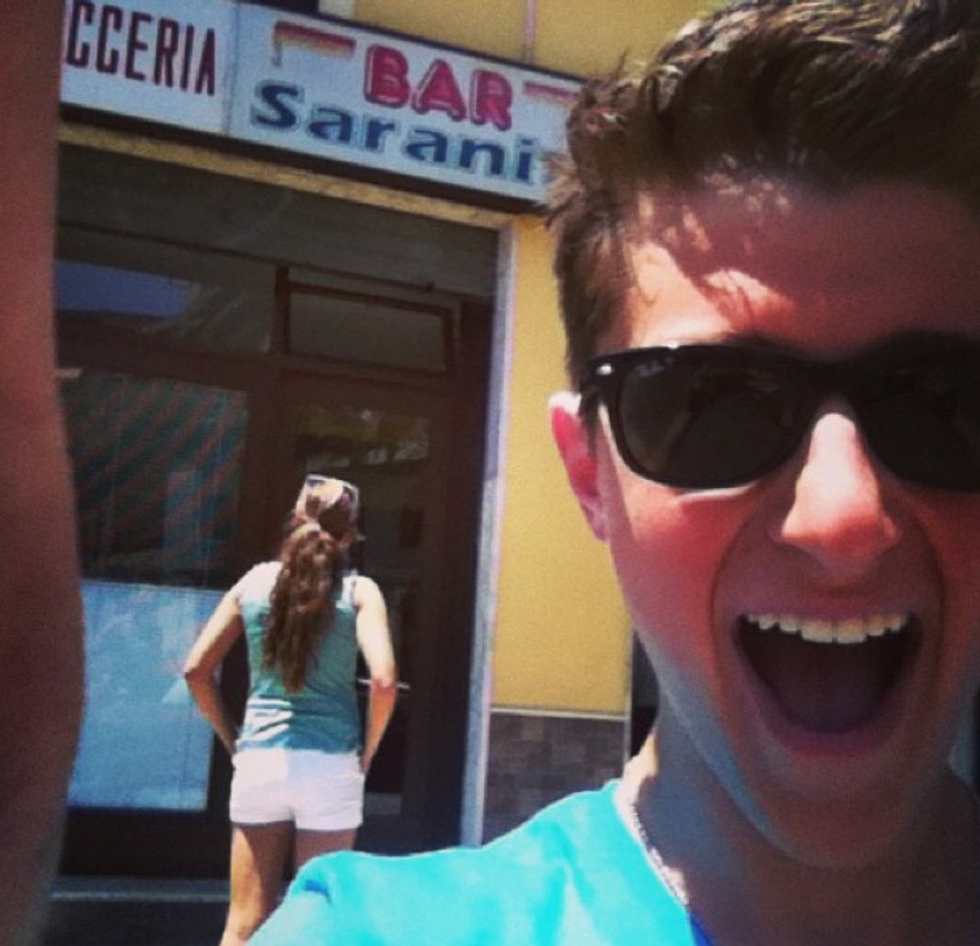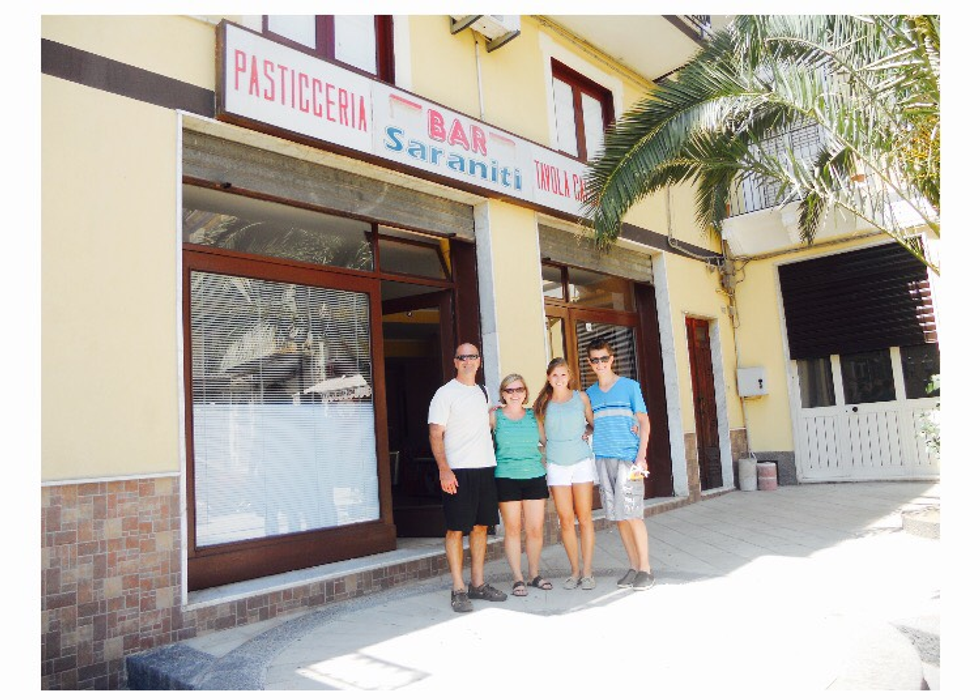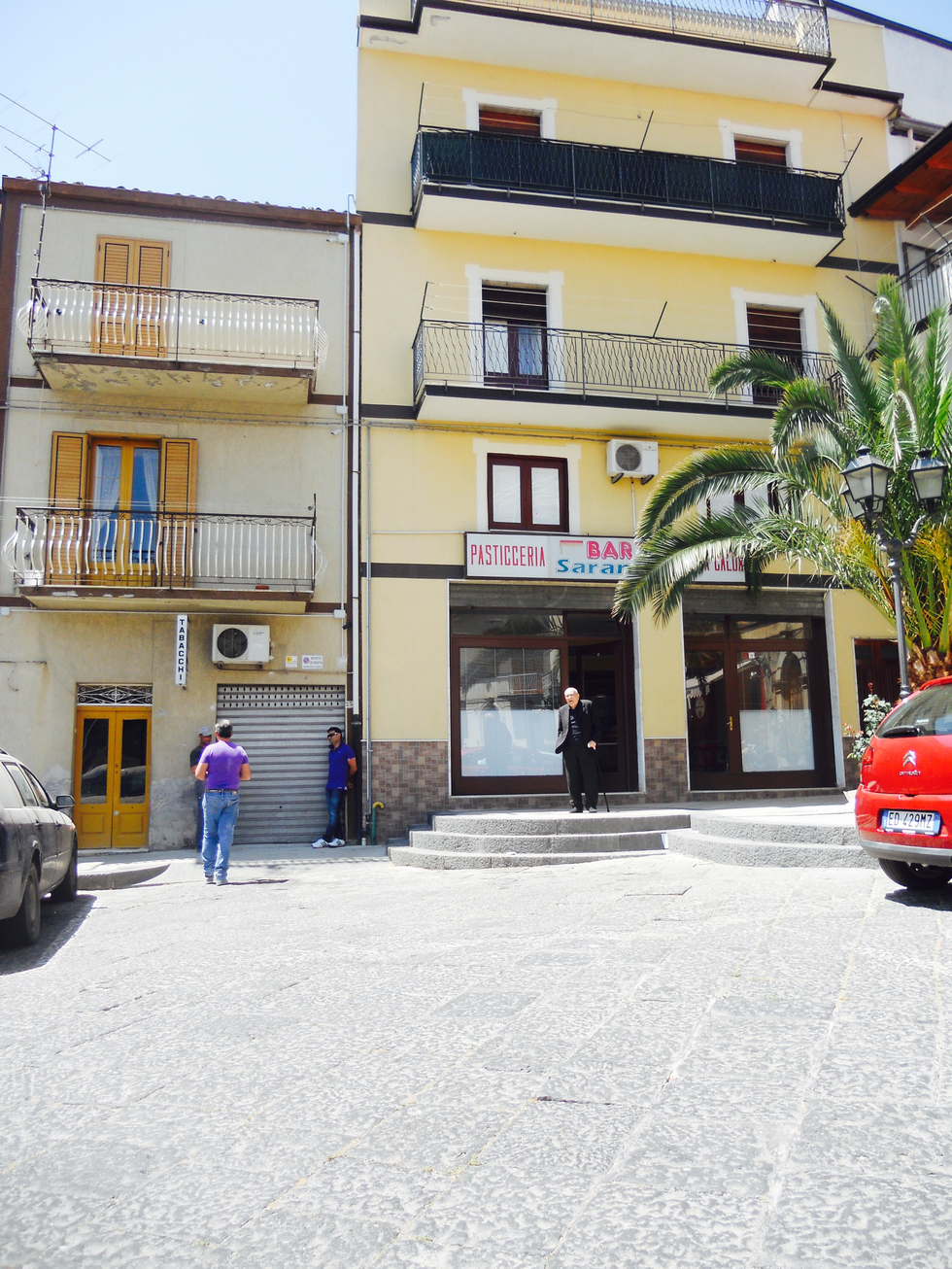Ninety-Seven
To anyone’s eye, it was like you had stepped into a scene from the Godfather, we had suddenly been transported into a small Sicilian village in 1940. To my family it was more than that, we were looking at a giant portrait of our heritage, our mannerisms, our distinct personalities, but most importantly, ourselves as a whole. Cesarò can be described as a little big town, it is little by means of it seeming as if everyone knows each other, but from an aerial view, it is vast as the snow that covered Mount Etna from the distance. All the houses and cobblestone walkways were in the same, light, tan shade with some buildings standing out with their dark wine and sunset orange rooftops or walls. When we were children, my father would tell my sister and I stories of this far off village as if it was a fairytale. “When I take you one day, you’ll realize how incredible it is, you’ll learn so much of the Saraniti family.” Yes, he was definitely correct on that part, but I never would have realized how the experience changed the way I viewed myself. It were the smallest things that got to me that day, like a bar, a glass of grappa , a wave goodbye, and the number ninety-seven.
It was extremely difficult to drive through the veins of the little town, but after the few dents and gasps of air, it seemed as we miraculously arrived to a plaza. I knew exactly where we were because my father’s vivid descriptions in my childhood. Behind us was a little bar. On top, was an older sign with the name “Bar Saraniti” written in a bright red. Saraniti was written in light blue. The building stood out in a light butter tone with a large palm tree branching out next to it. There is a story to why this bar is so significant to my family. A decade before, my grandma, grandpa, aunt, and dad visited the village to see where our Great Grandfather lived before moving to the United States. They found the bar, and out of curiosity went in. The owner realized they too were Saraniti’s and then invited them to his car. After a long drive up the hill, he brought them to a house. Inside, multitudes of other Saraniti’s waiting to meet their American brethren. It was my sister and I’s turn to have a similar experience. We didn’t give any notice that we would visit. As I exited the vehicle into the warm July sun, I was surprised to not only see the Saraniti Bar sign, but an entire street was named after us. My last name is unique to an American’s ear, but here, it was popular and I automatically felt a sign of belonging. We stepped into the tiny establishment, it was a typical bar. The salmon walls had little cracks and there were old wooden tables with metal chairs. Hanging were signs for beers and paintings of Italian landscapes. In a small radio, a Luciano Pavarotti aria could have been cheerfully playing. The bar itself was small, with a dark brown wooden surface with liquors jumbled across its surface. Nobody was there, and we stood there for a few moments, looking around, myself in awe. It was like looking at an iconic landmark like the Eiffel Tower.
After a minute or two, my dad raised his voice a notch and said “Hello?” We waited a few moments more, then, we could hear footsteps slowly come down the old staircase by the bar. A short older woman appeared. Her hair was short, curly, and had a light brown tone. She wore a royal blue skirt and jacket with an extravagant necklace. “Ciao!” she said. “Ciao!” we said back. That is as much Italian you could get out of us. Typical Italian Americans. My dad remembered her from his last visit, she is considered my great cousin. He pulled out an old, wrinkled picture from his wallet of him and her in front of the bar. Her eyes widened in joy and she gave a big grin. Though she spoke no English, we could still comprehend her excitement in Italian. She shuffled to her telephone and dialed a number. In her strong Sicilian dialect, she began to nag her husband to come down to meet us. While waiting, she went across the bar and poured us all small glasses of grappa (Italian moonshine). She set it on the table we sat at and I began to stare at it. It was the summer of 2012 and I just got out of my sophomore year of high school. It was a rarity for a person to nonchalantly pour out a drink to a skinny cross-country runner who has slowly been getting out of his awkward freshman phase. I drank the cinnamon scented gasoline with small sips, during this, she began to grin. I felt a feeling of respect on both ends, she was glad we accepted the gift, and I felt respect that she would pour such a strong delicacy to a stranger.
A few moments later the older gentleman appeared. He wore an all-black suit and held a cane blacker and thinner than licorice. He squinted behind his coke bottle glasses and gave a larger grin than his wife. We gave firm handshakes and tried our best to communicate. We knew we couldn’t speak each others languages, but we had nothing to lose. Suddenly, while the woman spoke, she pointed toward her husband and said “novantasette.” “Nintey-seven!” my sister said. “She said he’s ninety-seven!” Thanks to my sister’s basic Spanish in high school, she was able to understand him. It was a basic sentence, yet it was able to connect us. That’s the power of words. There more than just words, they can change your emotions in a split second. This little moment made me keep thinking “One day. I have to understand what they’re saying”.
It was time for us to move on to see what the village had to offer. We needed to make it to Taormina that night and we gave the couple the iconic kisses on both cheeks. My family and I stepped into our car and as we backed out, we looked behind and saw the old gentleman slowly walk out of the bar. As he stood in the heat, he waved until we left. We all gave a big Arriverderci. I couldn’t take my eyes off of him until he was completely out of my sight. It was such a comforting sight to see, no matter if we spoke each other’s languages or even if we were related, family is family. I look back at that day and I know I learned a lot. That day made me to multiple things afterwards, may it be buying a Rosetta Stone for Italian or having the Sicilian flag in my room. My only hope is that my children can have an incredible experience visiting Cesarò as well, of course, while having a bit better understanding of the language than us of course.





















